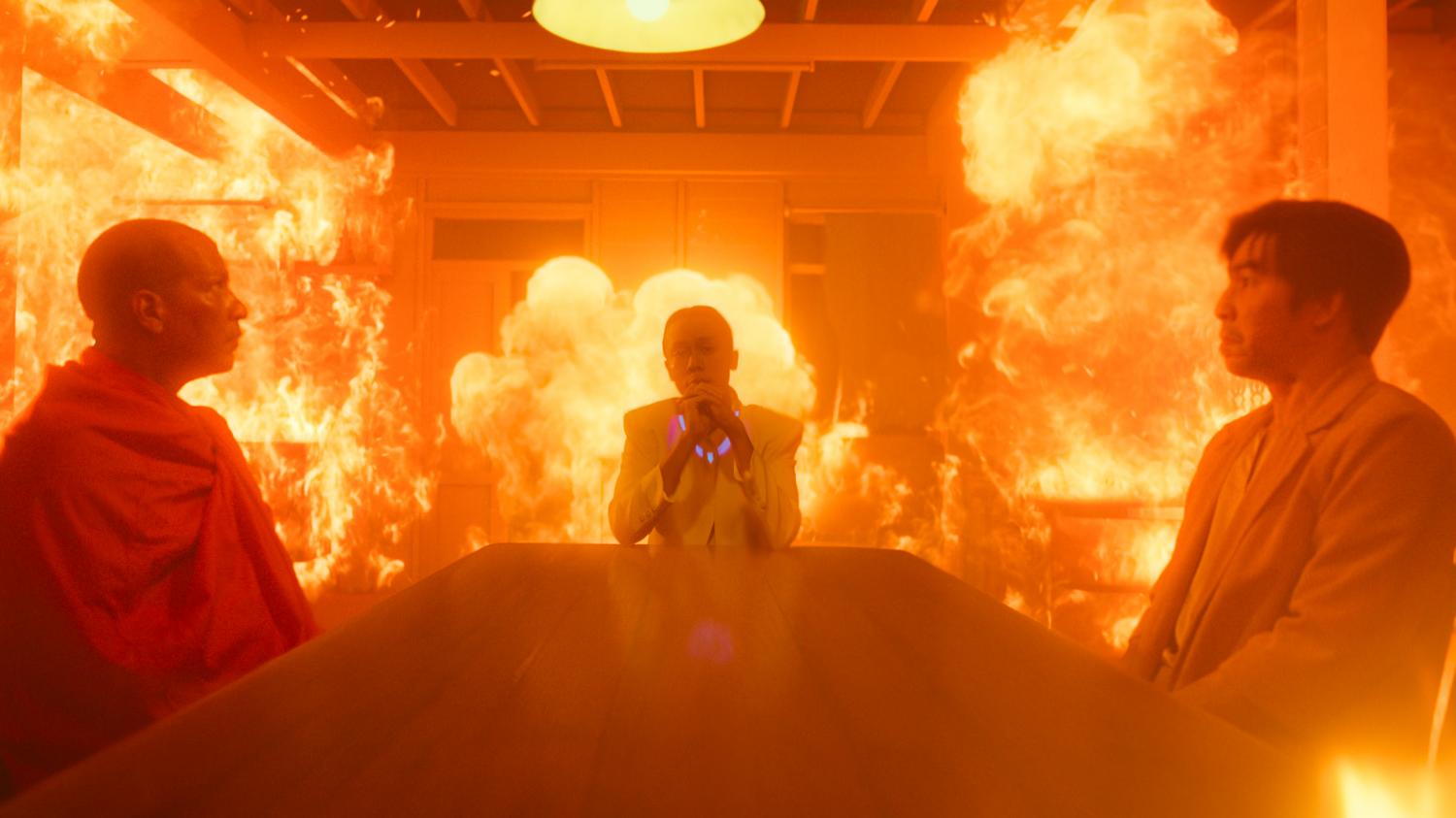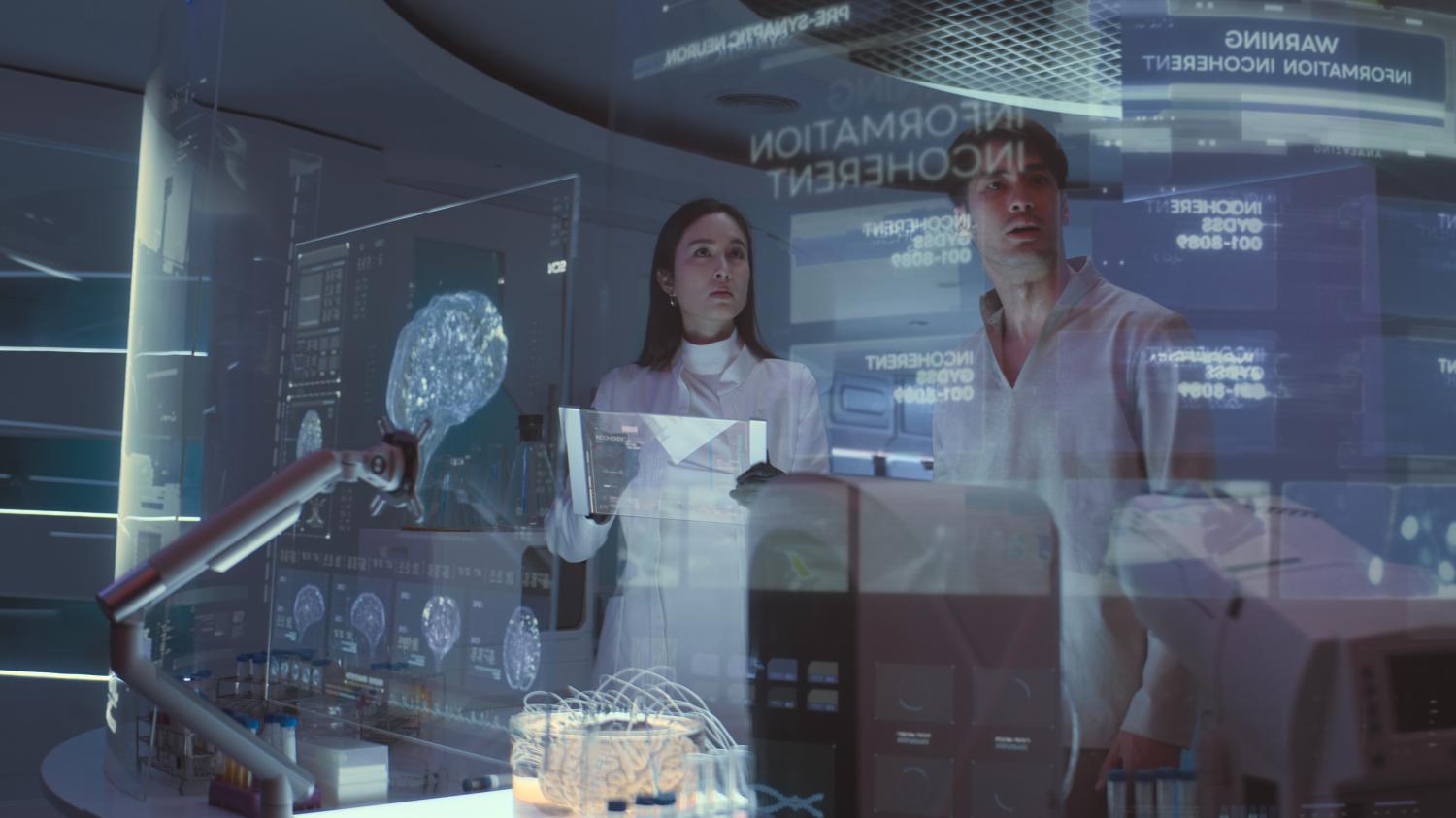Thailand has long been celebrated for its vibrant traditions and unique cultural identity. Yet, in Tomorrow And I, Netflix's ambitious new anthology series debuting today, viewers are invited to imagine a radically transformed Thailand -- one where advanced technologies disrupt deeply entrenched values, sparking tension, reflection and debate.
Directed by the acclaimed Paween Purijitpanya, the four-episode series marries science fiction with Thai cultural identity, creating a blend that's as thought-provoking as it is visually stunning.
The series explores groundbreaking yet plausible scientific concepts -- cloning, AI and genetic modification -- juxtaposed against the moral and ethical frameworks of Thai society. Each 70 minute episode tells a self-contained story, from resurrecting loved ones via cloning to a world plagued by a tentacle-inducing pandemic. These narratives intertwine futuristic speculation with deeply personal struggles, reflecting the director's vision for a unique Thai take on the sci-fi genre.
"We don't see sci-fi very often in Thailand," explained director Paween. "I think it's worth exploring what Thailand will look like in the future. What would it be like when technology is more advanced yet Thai people's ideas and beliefs remain the same?"
This tension between technological advancement and cultural constancy forms the series' core, offering a distinctive lens on how modernity reshapes identity and morality.
The anthology opens with Black Sheep, a poignant tale of grief and scientific ambition. After his astronaut wife Noon (Waruntorn Paonil) dies in a shuttle explosion, Nont (Pakorn Chatborrirak) turns to cloning in a desperate bid to bring her back. Collaborating with Noon's friend and fellow scientist Vee (Treechada Hongsyok), Nont explores cloning technology typically reserved for pets, with emotionally charged results.

From left, Ray Macdonald, Aelm Thavornsiri and Pongsatorn Jongwilas in Tomorrow And I. Courtesy of Netflix
"Nont's pain mirrors a universal human longing -- to rewrite loss," said Paween. "But what happens when that desire clashes with nature's laws?" This dilemma is compounded by societal resistance to cloning, highlighting the broader tension between scientific progress and cultural conservatism.
Next comes Paradistopia, set in a futuristic Gamalore transformed into a hub of robotic adult entertainment. Violette Wautier's Jessica spearheads this controversial innovation, developing hyper-realistic sex robots based on data from human counterparts.
In Jessica's world, technology offers new possibilities but also raises profound questions about the commodification of intimacy. Her hypersexual boyfriend Witt (Timethai), serves as the project's guinea pig, further complicating her personal ethics.
"Jessica's story is provocative because it forces us to question what happens when morality collides with progress," said Paween. "It's not just about technology -- it's about the people using it." The episode's gritty exploration of moral compromise invites viewers to confront their own biases about technological innovation and its societal implications.
In Buddha Data, a monk (Ray Macdonald) confronts an AI revolutionising religion with algorithmically updated teachings. The AI, called Ultra, promises immediate karmic rewards, challenging traditional Buddhist concepts of patience and faith. Ultra is the brainchild of Neo (Aelm Thavornsiri), a charismatic tech entrepreneur whose vision of a more immediate and accessible faith gains widespread appeal. The episode depicts a society struggling to reconcile timeless spiritual practices with the promise of modern technology.
"This episode explores something I deeply care about -- how religion is adapting in a world dominated by technology," shared the filmmaker. Monk Anek's journey, assisted by his former colleague Atom (Pongsatorn Jongwilas), reflects a broader struggle to preserve cultural identity in the face of rapid change.
The series culminates in Octopus Girl, set in a waterlogged 2051. Amid perpetual rainfall and a vaccine side effect, a young girl named Kalapangha (Wanichaya Pornpanarittichai) navigates survival and acceptance in her struggling community. Kalapangha, a gifted singer, lives in the Neo Klong Toey slum, where the vaccine AquaVac -- a last-ditch response to a global pandemic -- has unforeseen and grotesque effects.
"It's the most visually surreal episode," the director said. "Yet, it reflects the very real consequences of global warming and how marginalised communities bear the brunt of these crises." This visually arresting story blends dystopian sci-fi with an intimate tale of friendship and resilience, painting a haunting picture of a world pushed to its limits.
The scientific rigour behind Tomorrow And I elevates its narratives from speculative fiction to chilling plausibility.
"Every scientific hypothesis in the story is something that we have already researched," Paween said. Collaborating with experts like Dr Bank Ngamarunchot, a science and technology policy researcher, and Prof Dr Thara Suwanitchayaporn, a Thai doctor studying in California, the team ensured that each scenario was anchored in credible possibilities. These real-world foundations lend an air of inevitability to the series, making its futuristic visions feel eerily close to home.
"For example," Paween noted, "the cloning technology in Black Sheep or the AI in Buddha Data are based on current advancements, but we've taken them a few steps further".
This commitment to authenticity amplifies the emotional resonance of each story. By rooting its speculative elements in real science, the series challenges viewers to consider not only what is possible but also what is likely in our own lifetimes.
Making Tomorrow And I was a feat of both creative ambition and logistical complexity.
"It's like making four movies at the same time," Paween explained. With each episode having its own cast, tone, and visual style, the project required immense coordination over its two-year production timeline. Developing the script alone took a full year, followed by another year of filming -- a testament to the meticulous care invested in every detail.
Though gruelling, the process allowed Paween to realise his vision on an unprecedented scale.
"It is possible to develop imagination into real images," he said. "It is a place where we can challenge the viewer and challenge the creator at the same time." Netflix's support was instrumental, providing the resources to push boundaries and bring a uniquely Thai sci-fi series to global audiences.
Despite the ambitious scope of its narratives, Tomorrow And I is deeply personal for its creator.
"Each story came from within myself, my inner pain," Paween revealed. "The pain from looking at a society that I can't do anything about."
Whether confronting corruption in religious institutions, global warming's devastating impact, or society's resistance to progress, the episodes reflect the director's frustrations with modern issues that feel overwhelming and insurmountable.
This personal connection imbues the series with a raw emotional power.
"We feel pain from the misbehaving monkhood. We feel pain from prostitution. We feel pain from global warming. We feel pain from not accepting differences," Paween pointed out. By channelling these societal critiques into compelling stories, Tomorrow And I transcends its sci-fi trappings to offer a deeply human perspective on pressing global challenges.
For Paween, these stories are as much about sparking dialogue as they are about entertaining audiences.
"I want people to enjoy the story we present, but I also hope it sparks discussion -- on Facebook, Twitter or any platform," he said. By blending thrilling narratives with ethical quandaries, the series invites viewers to reflect on the rapidly evolving relationship between humanity, technology and tradition.
As Tomorrow And I prepares for its Netflix debut, it promises to be a turning point in Thai television. Its provocative premise coupled with a commitment to authentic storytelling sets it apart as a bold experiment in global sci-fi storytelling. By addressing universal themes of loss, morality, faith and survival through a uniquely Thai lens, the anthology captures the imagination while prompting reflection on the future we are collectively building.
With its blend of cultural specificity and universal resonance, Tomorrow And I offers a glimpse into a future both tantalising and terrifying. More than just a series, it's a call to engage with the ethical dilemmas of our time before tomorrow becomes today. For director Paween, the hope is simple: "That people will watch, discuss and think about what kind of world we want to live in."






